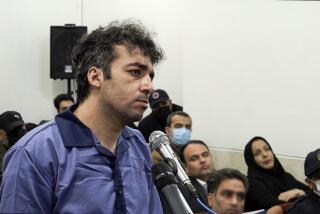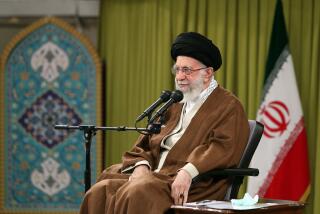EXECUTIONS : Egypt Curbing Muslim Militants--and Civil Rights, Critics Say
- Share via
KAHK, Egypt — Ramadan Mohammed Moursi and his wife were to visit their son, Moursi, in prison last month. But before they got there, they received a message from the jail. The visit would be unnecessary. Their son had been hanged that morning.
The couple made the long journey from their village near the oasis of Fayoum into the heart of Cairo, where they were permitted to wash Moursi’s body and wrap it for burial.
But officials said a funeral--when the execution of a young Islamic fundamentalist accused of killing a police officer could spark riots in tinderbox villages--was out of the question.
So officials sealed off much of Fayoum from outside eyes and brought Moursi’s body home themselves, in a police truck. They buried it in the village cemetery with no family prayers. And on July 22, the only sound that could be heard in this dusty village was the sound of Moursi’s mother and sisters wailing and keening in a hot room of the family hovel.
“What you hear inside is the screaming of the truth,” Moursi’s young uncle said, standing in the empty street outside. “God will be the final judge. There will be a day when these farmers and the judges will stand next to each other.”
A young Egyptian man standing next to him explained why the family had not been permitted by the government to mourn: “They’re afraid of the dead. They know he is more dangerous to them dead than he ever was when he was alive.”
This scene has been repeated in villages across Egypt in recent weeks as the government began the most sweeping series of executions for political crimes in more than four decades. In all, more than a dozen men have been hanged in government prisons since June, marking a new resolve on the part of the government of President Hosni Mubarak to stem a wave of Islamic fundamentalist violence that is the worst in the country’s troubled history.
Almost two dozen Muslim militants have been sentenced to death by military courts this year in cases ranging from attacks on foreign tourists to police killings, bombings and the attempted assassination of Information Minister Safwat Sharif. More than 170 people have been killed in the last year.
Government officials say there has been public outrage against Islamic extremists, especially since recent bombings that killed and maimed ordinary Egyptians. The attacks have left the public demanding a response and ready, perhaps for the first time, to tolerate a large number of executions when public confidence in the government has been relatively low.
But defense lawyers and human rights officials say the harsh anti-terrorism law under which most were convicted--it permits quick trials with no witnesses called before military courts--is sending a wave of victims to the gallows without even rudimentary guarantees of fair trial.
Moursi, 19, was arrested on March 3, 1992, for the ambush killing of a Fayoum police intelligence officer who was widely unpopular among Islamic fundamentalists because of his brutal interrogation procedures against suspected extremists and their families.
Moursi was executed less than 15 months later, still protesting his innocence. His family and lawyers say he was not permitted to call in his own lawyer and had to use government-appointed counsel. They say he had an appeal pending on Aug. 5, which was negated by his death.
“Could an American citizen tolerate these emergency laws and this crackdown for even one day?” asked Adel Laimouny, who represented Moursi. “Our prisons are full of people who have been arrested under martial law, some of them for as long as three years without trial. Some of them have several court orders for their release, and still they are kept behind bars.”
Laimouny represents another native of Fayoum, Sheik Omar Abdul Rahman, the blind Egyptian cleric whose supporters in New York are accused in the bombing of the World Trade Center and in plotting to blow up other U.S. targets.
The cleric’s young Egyptian followers fill the impoverished villages around Fayoum, where difficult economic conditions that make life difficult in Cairo make it hopeless for young rural men who may graduate from college but have no hope of finding a job.
Kahk has been known as a hotbed of Islamic extremism, and the village paid a price for that reputation after police officer Ahmed Alaa was ambushed in his car last year. Residents provided a chilling tale of what ensued in the next three days, as police officers swept into the village night and day, arresting family members of suspects and burning the contents of four houses, including the Moursi family home.
More to Read
Sign up for Essential California
The most important California stories and recommendations in your inbox every morning.
You may occasionally receive promotional content from the Los Angeles Times.













